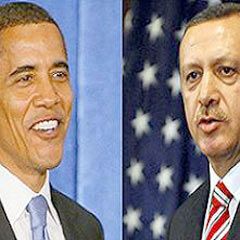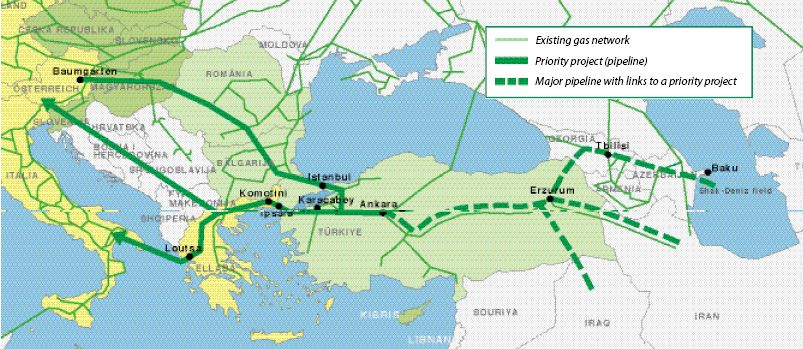Turkey Key to Washington’s Geopolitical Pivot
Politics / GeoPolitics Apr 14, 2009 - 08:13 AM GMT

 The recent visit of US President Obama to Turkey was far more significant than the President’s speech would suggest. For Washington Turkey today has become a geopolitical “pivot state” which is in the position to tilt the Eurasian power equation towards Washington or significantly away from it depending on how Turkey develops its ties with Moscow and its role regarding key energy pipelines.
The recent visit of US President Obama to Turkey was far more significant than the President’s speech would suggest. For Washington Turkey today has become a geopolitical “pivot state” which is in the position to tilt the Eurasian power equation towards Washington or significantly away from it depending on how Turkey develops its ties with Moscow and its role regarding key energy pipelines.
 If Ankara decides to collaborate more closely with Russia, Georgia's position is precarious and Azerbaijan's natural gas pipeline route to Europe, the so-called Nabucco Pipeline, is blocked. If it cooperates with the United States and manages to reach a stable treaty with Armenia under US auspices, the Russian position in the Caucasus is weakened and an alternative route for natural gas to Europe opens up, decreasing Russian leverage against Europe.
If Ankara decides to collaborate more closely with Russia, Georgia's position is precarious and Azerbaijan's natural gas pipeline route to Europe, the so-called Nabucco Pipeline, is blocked. If it cooperates with the United States and manages to reach a stable treaty with Armenia under US auspices, the Russian position in the Caucasus is weakened and an alternative route for natural gas to Europe opens up, decreasing Russian leverage against Europe.
For Washington the key to bringing Germany into closer cooperation with the US is to weaken German dependence on Russian energy flows. Twice in the past three winters Washington has covertly incited its hand-picked President in Ukraine, Viktor Yushchenko to arrange an arbitrary cut off of Russian gas flows to Germany and other EU destinations. The only purpose of the actions was to convince EU governments that Russia was not a reliable energy partner. Now, with the Obama visit to Ankara, Washington is attempting to win Turkish support for its troubled Nabucco alternative gas pipeline through Turkey from Azerbaijan which would theoretically at least lessen EU dependence on Russian gas.
The Turkish-EU problem
However willing Turkish Prime Minister Erdogan might be to accommodate Obama, the question of Turkish relations with the EU is inextricably linked with the troublesome issue of Turkish membership to the EU, a move vehemently opposed by France and also less openly by Germany.

Turkey is one of the only routes energy from new sources can cross to Europe from the Middle East, Central Asia or the Caucasus. If Turkey — which has considerable influence in the Caucasus, Central Asia, Ukraine, the Middle East and the Balkans — is prepared to ally with the United States, Russia is on the defensive and German ties to Russia weaken considerably. If Turkey decides to cooperate with Russia instead, Russia retains the initiative and Germany is dependent on Russian energy. Since it became clear in Moscow that US strategy was to extend NATO to Russia’s front door via Ukraine and Georgia, Russia has moved to use its economic “carrot” its vast natural gas resources, to at the very least neutralize Western Europe, especially Germany, towards Russia. It is notable in that regard that the man chosen as Russia’s President in December 1999 had spent a significant part of his KGB career in Germany.
Turkey and the US Game
It is becoming clear that Obama and Washington are playing a deeper game. A few weeks before the meetings, when it had become obvious that the Europeans were not going to bend on the issues such as troops for Afghanistan or more economic stimulus that concerned the United States, Obama scheduled the trip to Turkey.
During the recent EU meetings in Prague Obama actively backed Turkey’s application for EU membership knowing well that that put especially France and Germany in a difficult position as EU membership would allow free migration which many EU countries fear. Obama deliberately confronted EU states with this knowing he was playing with geopolitical fire, especially as the US is no member of the EU. It was a deliberate and cheap way to score points with the Erdogan government of Turkey.
During the NATO meeting, a key item on the agenda was the selection of a new alliance secretary-general. The favorite was former Danish Prime Minister Anders Fogh Rasmussen. Turkey opposed him because of his defense of cartoons depicting the Prophet Mohammed published in a Danish magazine. NATO operates on consensus, so any one member can block Rasmussen. The Turks backed off the veto, and in return won two key positions in NATO, including that of deputy secretary-general.
Turkey thereby boosted its standing in NATO, got Obama to vigorously defend the Turkish application for membership in the European Union, which of course the United States does not belong to. Obama then went to Turkey for a key international meeting that will allow him to further position the United States in relation to Islam.
The Russian Dimension
During US-Russian talks there had been no fundamental shift by Obama from the earlier position of the Bush Administration. Russia rejects Washington’s idea of pressuring IUran on their nuclear program in return for a bargain of an undefined nature with Washington over US planned missile and radar bases in Poland and the Czech Republic. The US claimed it need not rely on Russia to bring military and other supplies into Afghanistan, claiming it had reached agreement with Ukraine to transship mililtary supplies, a move designed by Washington to increase friction between Moscow and Kiew. Moreover, the NATO communique did not abandon the idea of Ukraine and Georgia being admitted to NATO. The key geopolitical prize for Washington remains Moscow but clearly Turkey is being wooed by Obama to play a role in that game.
Germany will clearly not join Obama in blocking Russia. Not only does Germany depend on Russia for energy supplies. She has no desire to confront a Russia that Berlin sees as no real immediate threat to Germany. For Berlin, at least now, they are not going to address the Russian question.
At the same time, an extremely important event between Turkey and Armenia is shaping up. Armenians had long held Turkey responsible for the mass murder of Armenians during and after World War I, a charge the Turks have denied. The US Congress is considering a provocative resolution condeming “Turkish genocide” agianst Armenians. Turkey is highly sensitive to these charges, and Congressional passage of such a resolution would have meant a Turkish break in diplomatic relations with Washington. Now since the Obama visit Ankara has begun to discuss an agreement with Armenia including diplomatic relations which would eliminate the impact of any potential US Congress resolution.
A Turkish opening to Armenia would alter the balance of power in the entire region. Since the August 2008 Georgia-Russia conflict the Caucasus, a strategically vital area to Moscow has been unstable. Russian troops remain in South Ossetia. Russia also has troops in Armenia meaning Russia has Georgia surrounded.
Turkey is the key link in this complex game of geopolitical balance of power between Washington and Moscow. If Turkey decides to collaborate with Russia Georgia’s position becomes very insecure and Azerbaijan’s possible pipeline route to Europe is blocked. If Turkey decides to cooperate with Washington and at the same time reaches a stable agreement with Armenia under US guidance, Russia’s entire position in the Caucasus is weakened and an alternative route for natural gas to Europe becomes available, reducing Russian leverage against Western Europe.
Therefore, having sat through fruitless meetings with the Europeans, Obama chose not to cause a pointless confrontation with a Europe that is out of options. Instead, Obama completed his trip by going to Turkey to discuss what the treaty with Armenia means and to try to convince the Turks to play for high stakes by challenging Russia in the Caucasus, rather than playing Russia's junior partner.
The most important Obama speech in his European tour came after Turkey won key posts in the NATO political structure with US backing. In his speech Obama sided with Turkey against the EU and in effect showed Turkey Washington was behind her. Obama’s speech addressed Turkey as an emerging regional power, which was well received in Ankara. The sweet words will cost Turkey dearly if it acts on them.
Moscow is not sitting passively by as Washington woos Turkey. Turkish President Abdullah Gul paid a four-day visit to the Russian Federation this February, where he met with President Dmitry Medvedev, Prime Minister Putin, and also traveled to Kazan, the capital of Tatarstan, where he discussed joint investments. Gul was accompanied by his minister for foreign trade and minister of energy, as well as a large delegation of Turkish businessmen. The stakes in this complex three-way Great Game for domination of Eurasia have been raised significantly following the Obama trip to Ankara. Turkey imports 65 percent of its natural gas and 25 percent of its oil from Russia. Therefore, Turkey is also developing a growing dependency on Russian energy resources, including coal.
On March 27, 2009, a memorandum was signed between the Azerbaijani oil company SOCAR and Russia's Gazprom. The memorandum includes a statement of deliveries, beginning in January 2010, of Azerbaijani natural gas to Russia.
Gazprom was particularly interested in signing such an agreement with Azerbaijan, not the least because Azerbaijan is the only state outside Iran or Turkmenistan, both of which are problematic, that could supply gas to the planned EU Nabucco pipeline, for transporting natural gas from Azerbaijan and the Central Asia states through Turkey to south-eastern Europe. In reality, gas may come only from Azerbaijan. Russia has proposed an alternative to Nabucco project, South Stream, also in need of Azerbaijani gas, so in effect Russia weakens the chances of realization of Nabucco. Obama strategy is clearly not less confrontational with Russia. It is merely playing with a slightly different deck of cards than did Cheney and Bush.
By F. William Engdahl
www.engdahl.oilgeopolitics.net
COPYRIGHT © 2009 F. William Engdahl. ALL RIGHTS RESERVED
* F. William Engdahl is the author of A Century of War: Anglo-American Oil Politics and the New World Order (Pluto Press) and Seeds of Destruction: The Hidden Agenda of Genetic Manipulation , www.globalresearch.ca . The present series is adapted from his new book, now in writing, The Rise and Fall of the American Century: Money and Empire in Our Era. He may be contacted through his website, www.engdahl.oilgeopolitics.net .
F. William Engdahl Archive |
© 2005-2022 http://www.MarketOracle.co.uk - The Market Oracle is a FREE Daily Financial Markets Analysis & Forecasting online publication.


